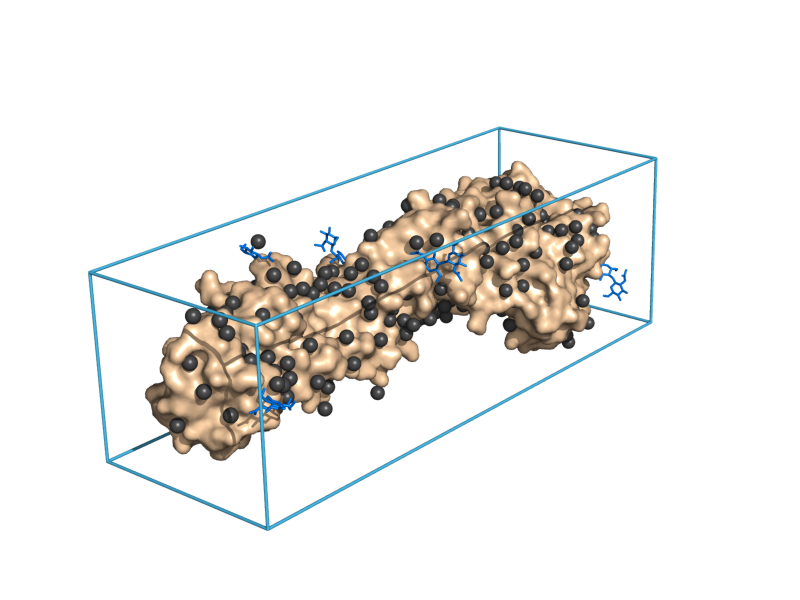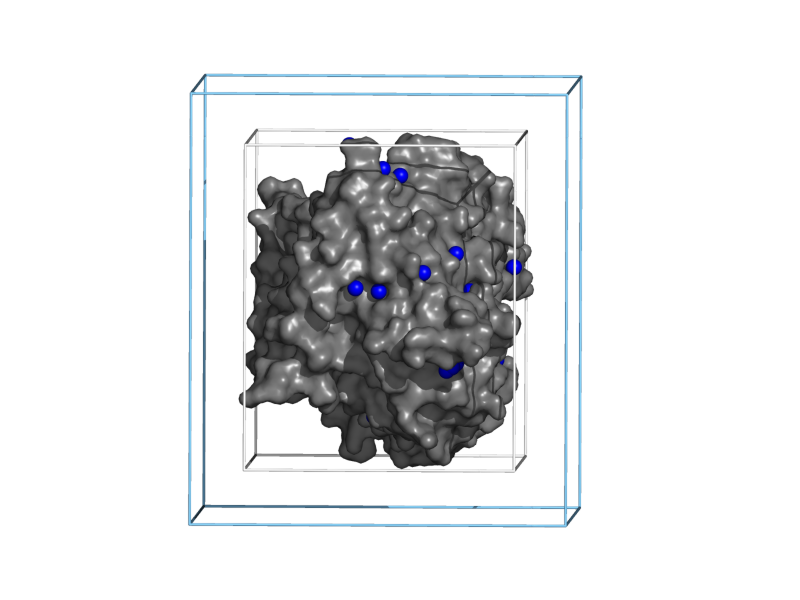This is a read-only mirror of pymolwiki.org
Difference between revisions of "DrawBoundingBox"
Jump to navigation
Jump to search
(Added the padding option and some useful print statements. Change the name to drawBoundingBox, plus some code alterations) |
m (11 revisions) |
||
| (8 intermediate revisions by 3 users not shown) | |||
| Line 4: | Line 4: | ||
<gallery> | <gallery> | ||
Image:DrawMinBB.png|Example of a bounding box | Image:DrawMinBB.png|Example of a bounding box | ||
| + | Image:bb_with_padding.png|Two bounding boxes, one with 0 padding, the other with 10 Ang padding. | ||
</gallery> | </gallery> | ||
| Line 11: | Line 12: | ||
fetch 1jsd | fetch 1jsd | ||
drawBoundingBox 1jsd, r=0.33, g=0.80 | drawBoundingBox 1jsd, r=0.33, g=0.80 | ||
| + | |||
| + | # example from above w/padding, draw it light blue | ||
| + | drawBoundingBox padding=10, r=0.5, g=0.8, b=1.0 | ||
</source> | </source> | ||
= Installation = | = Installation = | ||
| − | + | Copy the source code to your computer, and execute it by issuing the command "run /path/to/drawBoundingBox.py" in PyMOL. | |
| − | |||
| − | run /path/to/drawBoundingBox.py | ||
| − | |||
<source lang="python"> | <source lang="python"> | ||
| Line 24: | Line 25: | ||
from pymol import cmd | from pymol import cmd | ||
from random import randint | from random import randint | ||
| − | |||
############################################################################# | ############################################################################# | ||
| Line 70: | Line 70: | ||
""" | """ | ||
| − | ([minX, minY, minZ],[maxX, maxY, maxZ]) = cmd.get_extent( | + | ([minX, minY, minZ],[maxX, maxY, maxZ]) = cmd.get_extent(selection) |
print "Box dimensions (%.2f, %.2f, %.2f)" % (maxX-minX, maxY-minY, maxZ-minZ) | print "Box dimensions (%.2f, %.2f, %.2f)" % (maxX-minX, maxY-minY, maxZ-minZ) | ||
| Line 81: | Line 81: | ||
maxZ = maxZ + float(padding) | maxZ = maxZ + float(padding) | ||
| − | + | if padding != 0: | |
print "Box dimensions + padding (%.2f, %.2f, %.2f)" % (maxX-minX, maxY-minY, maxZ-minZ) | print "Box dimensions + padding (%.2f, %.2f, %.2f)" % (maxX-minX, maxY-minY, maxZ-minZ) | ||
| Line 137: | Line 137: | ||
cmd.load_cgo(boundingBox,boxName) | cmd.load_cgo(boundingBox,boxName) | ||
return boxName | return boxName | ||
| + | |||
| + | cmd.extend ("drawBoundingBox", drawBoundingBox) | ||
</source> | </source> | ||
| Line 144: | Line 146: | ||
[[Category:Script_Library|DrawMinBoundingBox]] | [[Category:Script_Library|DrawMinBoundingBox]] | ||
| + | [[Category:Math_Scripts]] | ||
[[Category:CGO]] | [[Category:CGO]] | ||
Latest revision as of 01:43, 28 March 2014
Overview
Draws a bounding box around a given selection.
Example
run ~/drawBoundingBox.py
fetch 1jsd
drawBoundingBox 1jsd, r=0.33, g=0.80
# example from above w/padding, draw it light blue
drawBoundingBox padding=10, r=0.5, g=0.8, b=1.0
Installation
Copy the source code to your computer, and execute it by issuing the command "run /path/to/drawBoundingBox.py" in PyMOL.
# -*- coding: utf-8 -*-
from pymol.cgo import *
from pymol import cmd
from random import randint
#############################################################################
#
# drawBoundingBox.py -- Draws a box surrounding a selection
#
#
# AUTHOR: Jason Vertrees
# DATE : 2/20/2009
# NOTES : See comments below.
#
#############################################################################
def drawBoundingBox(selection="(all)", padding=0.0, linewidth=2.0, r=1.0, g=1.0, b=1.0):
"""
DESCRIPTION
Given selection, draw the bounding box around it.
USAGE:
drawBoundingBox [selection, [padding, [linewidth, [r, [g, b]]]]]
PARAMETERS:
selection, the selection to enboxen. :-)
defaults to (all)
padding, defaults to 0
linewidth, width of box lines
defaults to 2.0
r, red color component, valid range is [0.0, 1.0]
defaults to 1.0
g, green color component, valid range is [0.0, 1.0]
defaults to 1.0
b, blue color component, valid range is [0.0, 1.0]
defaults to 1.0
RETURNS
string, the name of the CGO box
NOTES
* This function creates a randomly named CGO box that minimally spans the protein. The
user can specify the width of the lines, the padding and also the color.
"""
([minX, minY, minZ],[maxX, maxY, maxZ]) = cmd.get_extent(selection)
print "Box dimensions (%.2f, %.2f, %.2f)" % (maxX-minX, maxY-minY, maxZ-minZ)
minX = minX - float(padding)
minY = minY - float(padding)
minZ = minZ - float(padding)
maxX = maxX + float(padding)
maxY = maxY + float(padding)
maxZ = maxZ + float(padding)
if padding != 0:
print "Box dimensions + padding (%.2f, %.2f, %.2f)" % (maxX-minX, maxY-minY, maxZ-minZ)
boundingBox = [
LINEWIDTH, float(linewidth),
BEGIN, LINES,
COLOR, float(r), float(g), float(b),
VERTEX, minX, minY, minZ, #1
VERTEX, minX, minY, maxZ, #2
VERTEX, minX, maxY, minZ, #3
VERTEX, minX, maxY, maxZ, #4
VERTEX, maxX, minY, minZ, #5
VERTEX, maxX, minY, maxZ, #6
VERTEX, maxX, maxY, minZ, #7
VERTEX, maxX, maxY, maxZ, #8
VERTEX, minX, minY, minZ, #1
VERTEX, maxX, minY, minZ, #5
VERTEX, minX, maxY, minZ, #3
VERTEX, maxX, maxY, minZ, #7
VERTEX, minX, maxY, maxZ, #4
VERTEX, maxX, maxY, maxZ, #8
VERTEX, minX, minY, maxZ, #2
VERTEX, maxX, minY, maxZ, #6
VERTEX, minX, minY, minZ, #1
VERTEX, minX, maxY, minZ, #3
VERTEX, maxX, minY, minZ, #5
VERTEX, maxX, maxY, minZ, #7
VERTEX, minX, minY, maxZ, #2
VERTEX, minX, maxY, maxZ, #4
VERTEX, maxX, minY, maxZ, #6
VERTEX, maxX, maxY, maxZ, #8
END
]
boxName = "box_" + str(randint(0,10000))
while boxName in cmd.get_names():
boxName = "box_" + str(randint(0,10000))
cmd.load_cgo(boundingBox,boxName)
return boxName
cmd.extend ("drawBoundingBox", drawBoundingBox)

